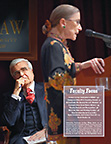Introducing Catherine Sharkey
Professor of Law
Printer Friendly Version
When Catherine Sharkey was a research fellow at Columbia Law School writing her first law review article, on the disconnect between the theoretical reasons for awarding punitive damages and the actual effect when they are granted, she sent a draft to mentors like her Yale law professor Judge Guido Calabresi of the U.S. Court of Appeals for the Second Circuit, for whom she had clerked, but also was brash enough to slip a copy to University of Chicago law professor Richard Epstein, whom she didn’t know but whose work on torts she particularly admired. Upon reading her draft, Epstein picked up the phone and called her. “We had a one-hour conversation that was a litany of everything wrong with my article,” says Sharkey. “He said, ‘You’re taking us to hell and you don’t even have a handbasket!’”
Despite his critique, Epstein was impressed. “I knew from the first conversation that this young professor would soon make it to the ranks of top legal scholars in any area in which she worked,” he recalls. “She was focused and determined, with an immense knowledge of the case law and a real commitment to intellectual rigor.”
Sharkey, 37, who comes to NYU from Columbia Law School, has gotten over the sting of her initial acquaintance with Epstein and now counts him among the impressive academics who inspire her with their passion for teaching and desire to apply their work to real issues; her own work, in turn, elicits high praise from them. Calabresi recalls telling Justice David Souter, who was interviewing Sharkey for a clerkship position, “A quite extraordinary thing has just happened: Cathy has drafted a short opinion from my chambers, and it is the first time I have taken an opinion of this sort and sent it in without changing a word.”
Sharkey’s scholarship and teaching focus on torts. She is forging new theories by using torts and products liability as a lens through which to examine the interplay between private law and public law. She is currently exploring the relationship between civil litigation and administrative regulation in the context of the pharmaceutical industry.
“Federalism in Action: FDA Regulatory Preemption in Pharmaceutical Cases in State Versus Federal Courts” is one of three upcoming law review articles that deal with federal preemption. In them, Sharkey analyzes whether courts and agencies work in tandem or at odds with each other when creating and enforcing regulations. If the U.S. Food and Drug Administration approves a pharmaceutical company’s drug, should that approval shield the company from future tort liability? “I find these areas particularly rich because of the questions of federalism that they inevitably implicate,” she says. Tort law operates at the state level, whereas agencies such as the FDA enforce federal statutes and regulations. “My aim,” she adds, “is to develop models of interaction between courts, agencies and Congress.”
There is a graceful push and pull to Sharkey’s scholarship and teaching that represents her love of theory and her devotion to practical problem-solving. This tension has played out in the evolution of her academic and professional career as well. Sharkey attended Yale as an undergraduate, where she first encountered economics in classes taught by renowned economists William Nordhaus and Nobel Prize-winner James Tobin. “I was mesmerized by the subject matter and how their research related to actual ongoing public policy issues,” Sharkey says. Reaching her senior year with more than enough credits—she would later graduate summa cum laude—Sharkey took off her first semester and pursued an independent study, an on-the-ground examination of the bail bond system in New Haven. She collected data from bail commission records and interviewed bail bondsmen, ultimately determining that the private sector, represented by bail bondsmen, mitigates racial discrimination in the public sphere, where courts set higher bail for black and Hispanic male detainees. She went on to win Yale’s prize for the best original economics thesis and found her work developed further by professors Ian Ayres and Joel Waldfogel in a 1994 Stanford Law Review article, “A Market Test for Race Discrimination in Bail Setting.”
Fast-talking and energetic, Sharkey was also an All-American goalie for the Yale women’s lacrosse team, becoming captain and most-valuable player as well as one of ten finalists for the NCAA Woman of the Year in 1992. While she didn’t win the latter designation, she was granted a Rhodes Scholarship at Oxford, where she pursued a master’s in economics. But the practical side of her won out: “Economics was theoretical,” says Sharkey; “in law I saw the problem-solving. I was influenced by pioneers like Richard Posner who were taking economic analysis and applying it to legal quandaries.” Professor Noah Feldman, now on the faculty of Harvard Law School, says of Sharkey, his friend since they both clerked for Justice Souter, “It’s rare to master the abstract theory and then match it up with the way things actually happen in the real world; Cathy does it in a smooth, seamless way.” He adds, “She has the whole academic package.”
Sharkey grew up in Baltimore, the third of four children. Her mother is a professor of management science at Loyola College. Her father was a commercial litigation attorney at a Baltimore firm, and is now an administrative law judge in Washington, D.C. “I thought I’d charted my own path,” she says. “But I think there were subtle influences.” She will have a chance to see whether law is destiny for the next generation, too, though she and her partner, Ina Bort, a partner at Kornstein Veisz Wexler & Pollard who practices commercial and matrimonial litigation, are doing their best to remain neutral. The couple have an eight-month-old son, Caleb. Recently, friends gave Caleb a T-shirt that reads, “Future Lawyer.” He hasn’t worn it yet.
—
